Persephone's Pomegranates: Mythological/Religious Symbolism & Early Medicinal Uses
It's Persephone Season!
"Some say that the pomegranate was the real apple of Eve, fruit of the womb, I would eat my way into perdition to taste you." — Jeanette Winterson
What is the purpose of this post? There are many reasons. To divulge the true essence of pomegranates. To use as an excuse to do hours of research on the mythology and symbolism of pomegranates. To figure out, if I can, why I am so fascinated by this red, bejeweled fruit.
Jane Grison describes pomegranates as “no more than a closet of juicy seeds.” Let us step into this closet and see which magical land we end up in then, shall we?

The Basics
Pomegranates are native to Iran and were first domesticated around 3000 BCE by the ancient Persians. They became commonly cultivated in the Western Mediterranean and Northern India. The Phoenicians brought pomegranates to Northern Africa and Mediterranean Europe around 2000 BCE. The Spanish brought pomegranates to Central and South America in the 16th century. Pomegranate trees had settled into the southern United States by the 18th century.
The word ‘pomegranate’ comes from Latin, pomum grantum, which means the “apple of many seeds.” Its scientific name is punica granatum, and it’s part of the Lythraceae plant family. In French, it’s called grenade. The words ‘garnet’ and ‘grenade’ come from ‘pomegranate.’
The pomegranate husk is made up of two layers, the epicarp (outer layer) and the mesocarp (inner layer). The mesocarp is where the scarlet seeds form. Pomegranate seeds are shaped like incisors, “fat at one end, where a blood blush pools, narrowing at the translucent tip, where the seed might, were it an actual tooth, root in the jaw.” Pomegranates have a sweet and tannic flavor and are a superfruit. They’re usually eaten raw or juiced, but they can be fermented into wine.
Religious, Pagan, & Mythological Symbolism Around the World
Pomegranates represent fertility throughout Europe, Persia, and Asia. Demeter and Persephone are both so intertwined in the cycle of life and death—Persephone in particular. While Demeter’s control or lack of control dictates the seasons, Persephone seems bound by it. But that, of course, depends on how one looks at her union with Hades.
In Greek mythology, pomegranates are symbolic of the Underworld. It represents life, regeneration, and marriage. After Hades abducted Persephone, he gave her pomegranate seeds which bound her to the Underworld after she ate them. In some myths, Persephone spends half the year in the living realm and the other half with Hades. In other myths, it’s four months with Hades, four months with Demeter, and four months wherever she chooses. There’s another one where it’s four months with Hades and eight months in the living realm, or vice versa. But you get the gist.

Persephone, Hades, and Demeter are not the only ones who are associated with pomegranates. This fruit is also sacred to Aphrodite. The love goddess Aphrodite is said to have planted the first pomegranate tree in honor of Adonis in Cyprus, aka Krypos.
In ancient Rome, pomegranate leaf crowns were woven for newlywed women, and pomegranate juice was used as a cure for infertility.
In Buddhism, pomegranate, citrus, and peach are known as the three blessed fruits. They represent the essence of favorable influences. The legend goes that “the demoness Hariti, who devoured children, was cured of her evil habit by the Buddha, who gave her a pomegranate to eat.”
In Babylonia, pomegranates were used as part of their worship of the goddess Ishtar. In Christianity, captured unicorns (who can only be tamed by virgins) are chained to a pomegranate tree, bleeding pomegranate juice. In the Quran, pomegranates grow in the Garden of Paradise.
Ancient & Modern Medicine
There was a time when pomegranate rind and root bark were used for tapeworm infestation. All parts of the pomegranate were used—root, bark, blossom, rind, seed, and aril—for various ailments. Pomegranates were used both as an aphrodisiac and a contraceptive.
According to the Doctrine of Signatures, the shape of pomegranate seeds signifies their power to heal pains in the mouth. In The Greek Herbal of Dioscorides, he writes:
“All sorts of pommegranats are of a pleasant taste and good for ye stomach ... The juice of the kernells prest out, being sod and mixed with Hony, are good for the ulcers that are in ye mouth and in ye Genitalls and in the seate, as also for the Pterygia in digitis and for the Nomae and ye excrescencies in ulcers, and for ye paines of ye eares, and for the griefs in ye nosrhrills ... The decoction of ye flowers is a collution of moist flagging gurnmes and of loose teeth... ye rinde having a binding faculty... but ye decoction of ye roots doth expel? and kill the Latas tineas ventris.” (Gunter RT. The Greek herbal of Dioscorides. Oxford: Oxford University Press, 1934:80-1.)
The so-called apple of many seeds is divided into chambers, much like a heart. This superfruit provides three times more antioxidants than green tea or red wine. Pomegranates are anti-inflammatory and have been shown to protect our cells from free radicals. It is also said to lower the risk of cancer and boost heart health.
Pomegranates are a fruit that will forever and ever and ever interest me. I will admit, this was not as deep of a dive as I expected to do, but I enjoyed doing research for it regardless. I want to do another related post at some point—like why we tend to romanticize Hades & Persephone’s myth or more about Aphrodite’s connection to pomegranates (it could include research I did for the short story I’m working on)—or at least do other posts on esoteric topics that interest me!
Sources:
https://digitalcommons.morris.umn.edu/cgi/viewcontent.cgi?article=1082&context=horizons
https://www.jstor.org/stable/25226108
https://daily.jstor.org/the-paradoxical-pomegranate/
https://www.webmd.com/diet/health-benefits-pomegranates
https://www.newworldencyclopedia.org/entry/Pomegranate
https://lithub.com/a-secret-symbolic-history-of-pomegranates/
https://www.kew.org/read-and-watch/surprising-pomegranate-facts
https://foodprint.org/real-food/pomegranates/
check out my book!
join the Tender Philosophia book club!
if you enjoy my work, please consider supporting me on Ko-fi (Stripe doesn’t work where i live)
YouTube | Instagram | Goodreads | Pinterest | Skillshare | Fiverr




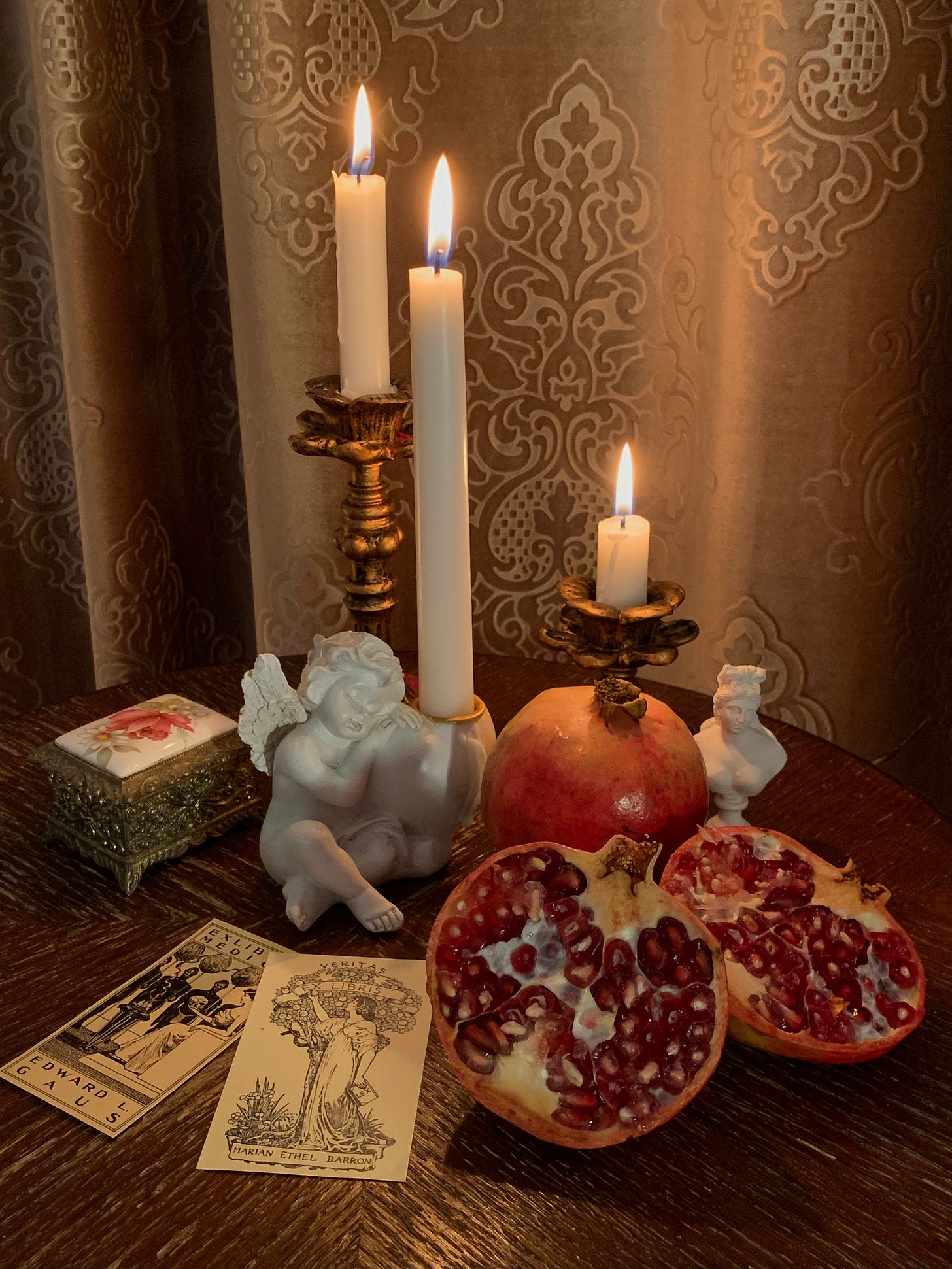
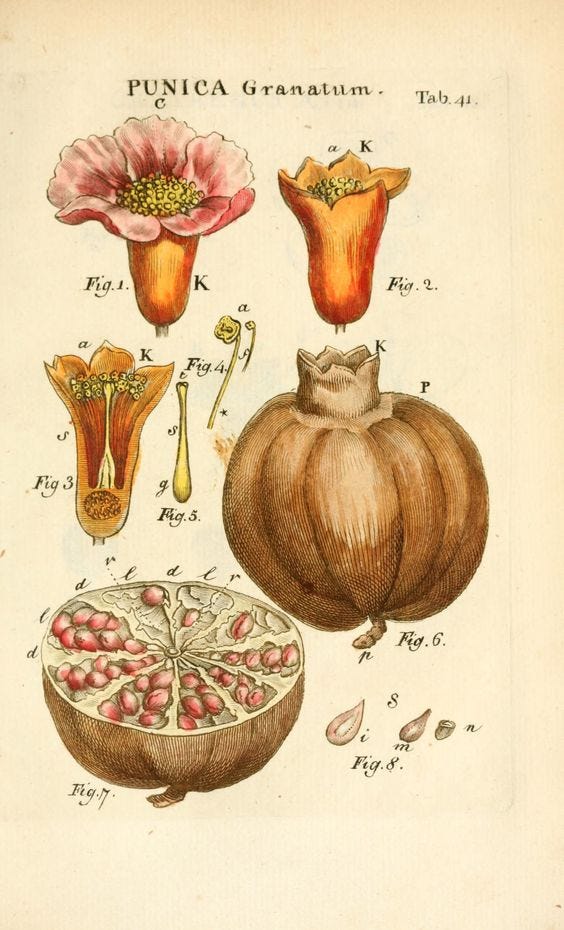

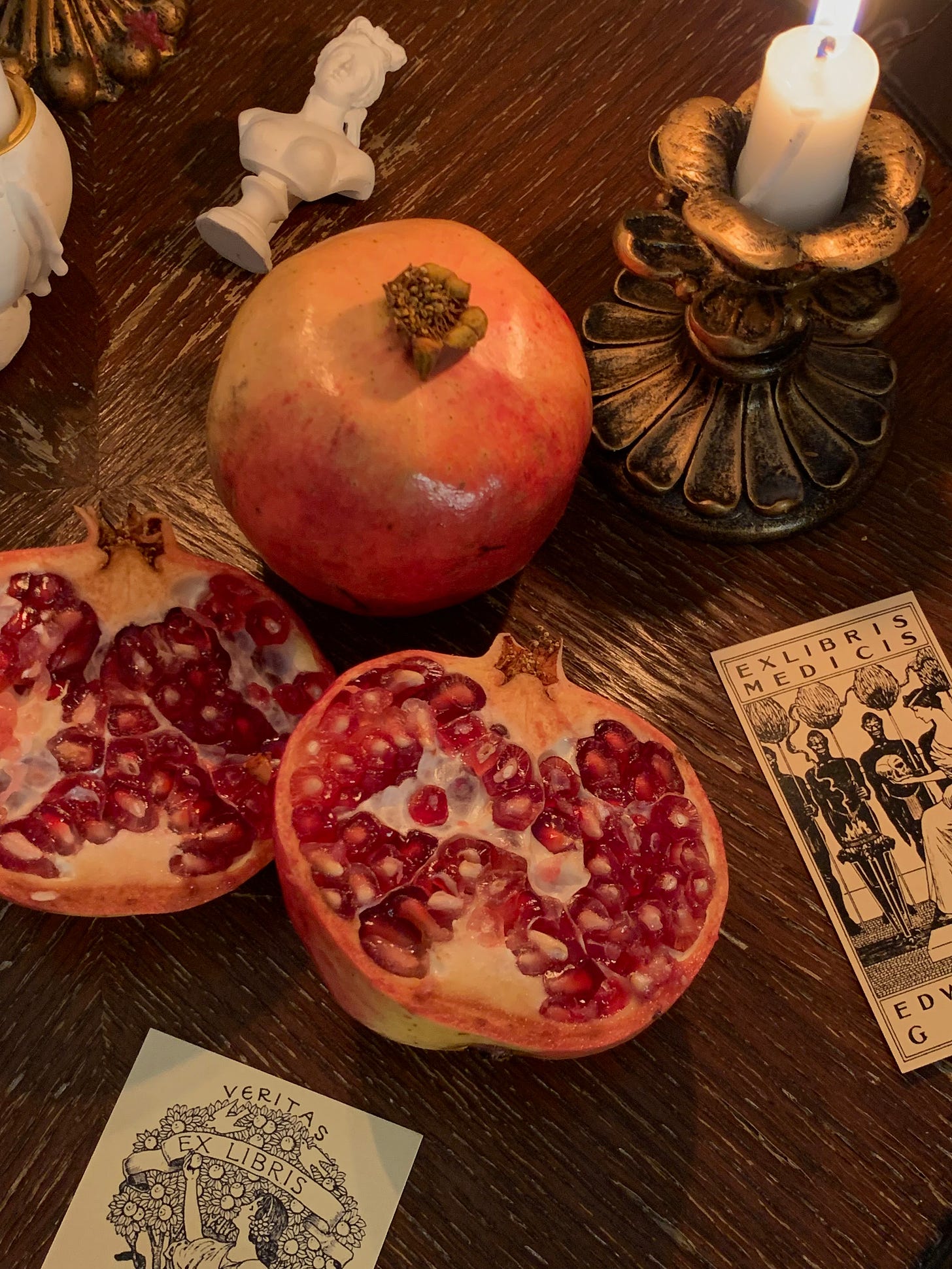



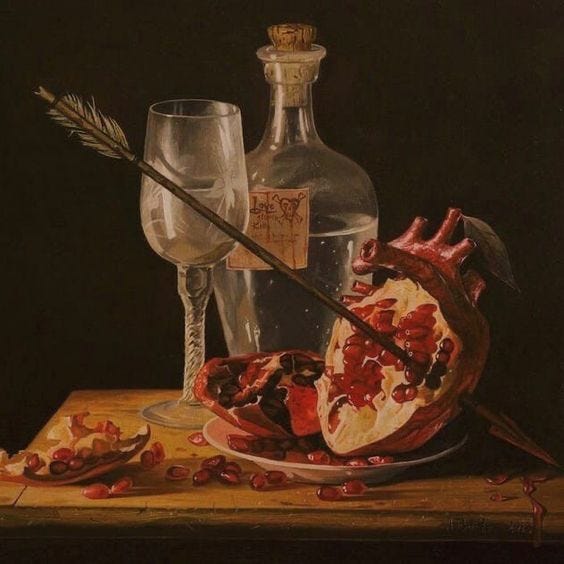
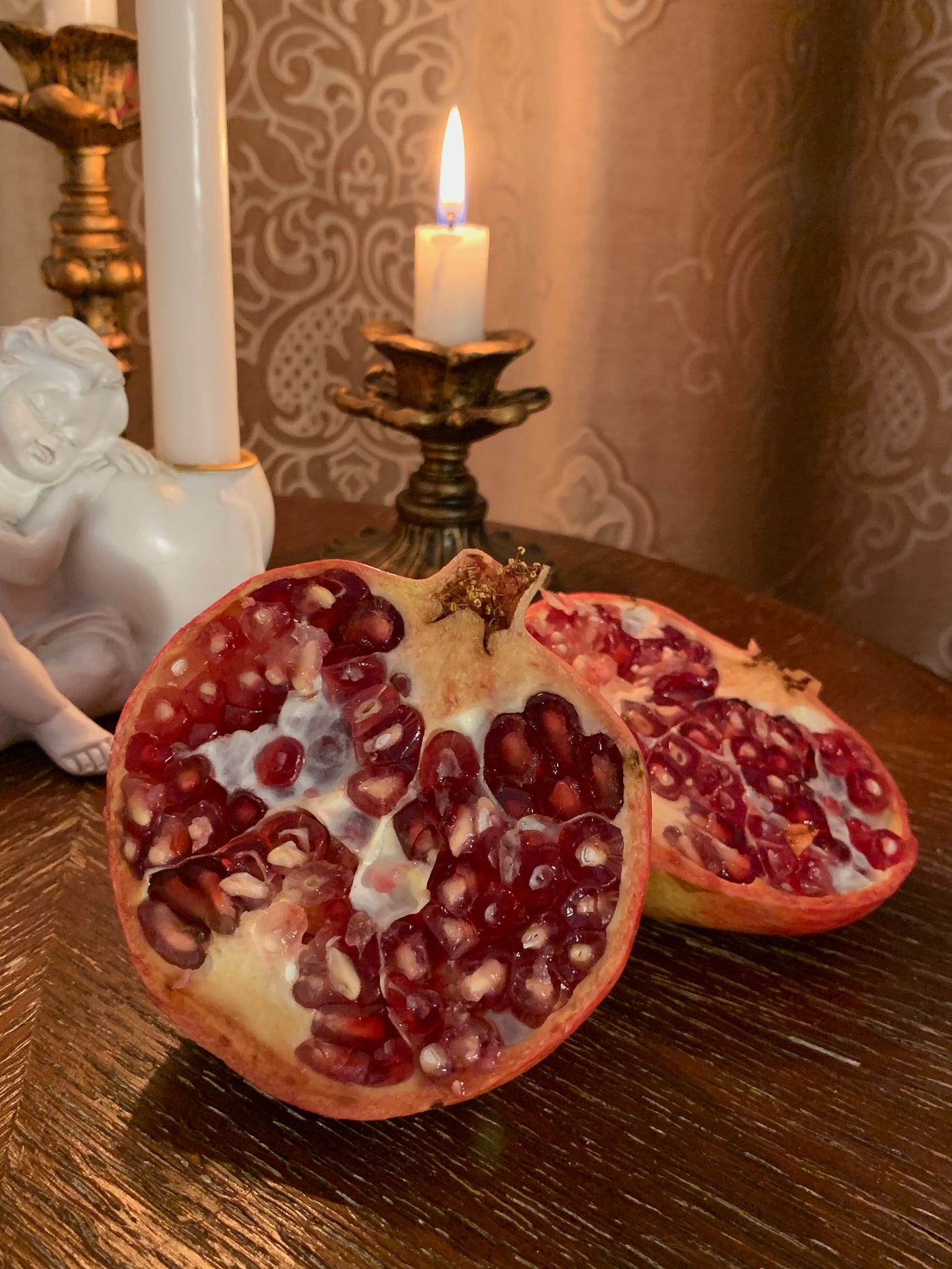


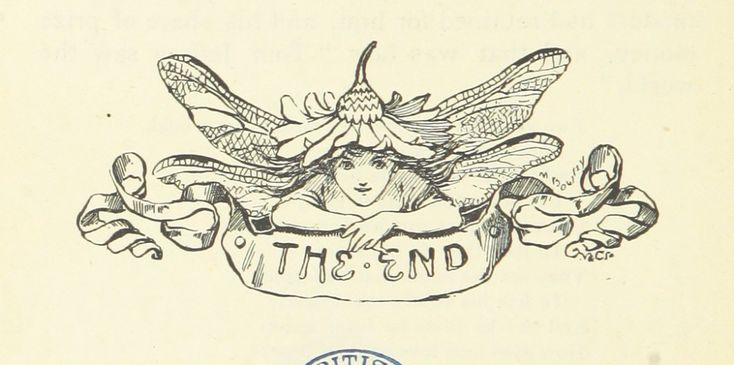
i love love love pomegranates. and i'm in love with this piece. this is so beautifully written <3
There is something so poetic about pomegranates, I love them and all symbolisms associated with it, especially the cannibalism one!